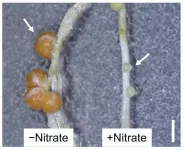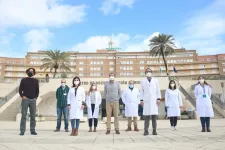(Press-News.org) A new study using human genetics suggests researchers should prioritize clinical trials of drugs that target two proteins to manage COVID-19 in its early stages.
The findings appeared online in the journal Nature Medicine in March 2021.
Based on their analyses, the researchers are calling for prioritizing clinical trials of drugs targeting the proteins IFNAR2 and ACE2. The goal is to identify existing drugs, either FDA-approved or in clinical development for other conditions, that can be repurposed for the early management of COVID-19. Doing so, they say, will help keep people with the virus from being hospitalized.
IFNAR2 is the target for approved drugs often used by patients with relapsing forms of the central nervous system disorder multiple sclerosis. The researchers believe the most promising ACE2 therapy against COVID-19 is a drug that was developed before the pandemic began and has been evaluated in clinical trials to reduce inflammatory response in patients with severe respiratory disorders.
Dr. Juan P. Casas, a physician epidemiologist at the Veterans Affairs Boston Healthcare System, led the study. The research included collaborators from the University of Cambridge and the European Bioinformatics Institute in England, and Istituto Italiano di Tecnologia in Italy.
"When we started this project early last summer, most COVID-19 trials were being done on hospitalized patients," Casas explains. "Very few treatments were being tested to give to patients early in the natural history of the disease. However, as the availability of testing against coronavirus increased, an opportunity opened to identify and treat COVID-19 patients before they progress to more severe forms that require hospitalization.
"The problem we tried to overcome," he adds, "is how to identify if existing drugs, either approved or in clinical development for other conditions, can be repurposed for the early management of COVID-19. Most commonly used strategies for drug repurposing are based on pre-clinical studies, such as experiments in cells or animal models. However, those types of studies may have problems of reproducibility or difficulties in translating their findings to humans. That usually leads to higher rates of failure in clinical trials."
Casas and his team used genetics as the starting point to identify drugs that can be repurposed for treating COVID-19. Large-scale human genetic studies have been widely used to inform drug development programs, with some research identifying COVID-19 drug targets.
"The reason we used human genetics is as follows," says Casas, who is also a faculty member at Harvard Medical School. "Given that more than 90% of drugs target a human protein encoded by a gene, the opportunity is there to use genetic variants within those druggable genes as instruments to anticipate the effects that drugs targeting the same protein will have. In other words, genetic studies that used variants within druggable genes can be conceived as natural randomized trials."
To put things into perspective, he refers to a gene that encodes a protein called PCSK9. The protein is the target of a class of drugs called PCSK9 inhibitors, which are used to lower cholesterol and prevent cardiovascular disease. Researchers discovered that class of drugs because of studies showing that people carrying a certain variant within the PCSK9 gene tend to have high levels of cholesterol and are at greater risk for cardiovascular disease.
"That kind of genetic study was pivotal to identify the PSCK9 protein as a target for drug discovery," Casas says. "It's known that drug targets with human genetic support have a least twice the odds of success compare to the targets without human genetic support."
Building on these known benefits of human genetics for drug discovery, Casas and his team set out to identify all genes that encode proteins that served as targets for FDA-approved drugs or drugs in clinical development. They called this set of 1,263 genes the "actionable druggable genome." The genes were from two large genetic datasets that totaled more than 7,500 hospitalized COVID-19 patients and more than 1 million COVID-free controls.
By comparing the genetic profiles of the hospitalized patients and the controls, and looking at which drugs target which genes, the researchers were able to pinpoint the drugs most likely to prevent severe cases of COVID-19 that require hospitalization.
The two datasets were VA's Million Veteran Program (MVP), one of the world's largest sources for health and genetic information, and the COVID-19 Host Genetics Initiative, a consortium of more than 1,000 scientists from over 50 countries working collaboratively to share data and ideas, recruit patients, and disseminate findings.
"This study gets to the heart of why we built MVP," says Dr. Sumitra Muralidhar, director of the Million Veteran Program. "It demonstrates the potential of MVP to discover new treatments, in this case for COVID-19."
ACE2 is highly relevant to COVID-19 because the coronavirus uses that protein to enter human cells. The most promising ACE2 therapy against COVID-19 is the drug APN01, which mimics the protein. The drug works by confusing the coronavirus so it attaches to the drug instead of the ACE2 protein in the human cell. Positive evidence is emerging from small clinical trials on the effectiveness of APN01 in COVID-19 patients, especially those that are hospitalized. "Hence, if our genetic findings are correct, there's a need to test this strategy in clinical trials in COVID-19 outpatients," Casas says.
The IFNAR2 protein serves as the target for a drug family known as type-I interferons, one of which is interferon beta. That drug is approved for treating patients with a degenerative form of multiple sclerosis, a chronic disease that attacks the central nervous system and disrupts the flow of information within the brain and between the brain and the body. The researchers showed that people with a certain variant of IFNAR2 had less chance of being hospitalized due to COVID-19, compared to people without the variant.
Currently, Casas is early into planning a clinical trial to test the efficiency and safety of interferon beta in COVID-19 outpatients in VA. If his genetic findings are confirmed by a trial, he says the goal would be to prescribe the drug after people are diagnosed with COVID-19 but before their conditions require hospitalization.
Casas sees a continued need for drugs to treat people in the early phase of COVID-19, despite the ongoing worldwide vaccination campaigns.
"This is largely due to two reasons," he says. "First, it will take some time to achieve the high levels of vaccine coverage needed to create herd immunity. In addition, certain coronavirus variants are emerging that seem to lead to a reduced vaccine efficiency. We are not yet in the clear."
INFORMATION:
PHILADELPHIA - Psychosocial stress - typically resulting from difficulty coping with challenging environments - may work synergistically to put women at significantly higher risk of developing coronary heart disease, according to a study by researchers at Drexel University's Dornsife School of Public Health, recently published in the Journal of the American Heart Association.
The study specifically suggests that the effects of job strain and social strain -- the negative aspect of social relationships -- on women is a powerful one-two punch. Together they are associated with a 21% higher risk of developing coronary heart disease. Job strain ...
There are millions of people who face the loss of their eyesight from degenerative eye diseases. The genetic disorder retinitis pigmentosa alone affects 1 in 4,000 people worldwide.
Today, there is technology available to offer partial eyesight to people with that syndrome. The Argus II, the world's first retinal prosthesis, reproduces some functions of a part of the eye essential to vision, to allow users to perceive movement and shapes.
While the field of retinal prostheses is still in its infancy, for hundreds of users around the globe, the "bionic eye" enriches the way they interact with the world on a daily basis. For instance, seeing outlines of objects enables them to move around unfamiliar environments with increased safety.
That is ...
A new biosealant therapy may help to stabilize injuries that cause cartilage to break down, paving the way for a future fix or - even better - begin working right away with new cells to enhance healing, according to a new animal-based study by researchers at the Perelman School of Medicine at the University of Pennsylvania. Their research was published in Advanced Healthcare Materials.
"Our research shows that using our hyaluronic acid hydrogel system at least temporarily stops cartilage degeneration that commonly occurs after injury and causes pain in joints," said the study's senior author, Robert Mauck, PhD, a professor of Orthopaedic Surgery and the director of Penn Medicine's McKay Orthopaedic Research Laboratory. "In addition to pausing cartilage breakdown, we think that applying ...
Experts have uncovered a new molecular reason why faecal transplants are highly effective in treating infections such as C. difficile (a nasty bacteria that can infect the bowel), which could lead to more targeted treatments for this and other similar diseases.
The study, published today in Gastroenterology, was led by experts from the University of Nottingham and Nottingham Trent University.
Clostridium difficile, also known as C. difficile or C. diff, is a bacterium that can infect the bowel and cause diarrhoea. The infection most commonly affects people who have recently been treated with antibiotics. It can spread easily to others.
A stool transplant - or to give it its full title "a faecal ...
New York, NY (April 9, 2021) - Sets of genes associated with resistance to immunotherapy in patients with metastatic urothelial cancer of the bladder have been identified and validated by researchers at Mount Sinai. In a study published in Clinical Cancer Research, the team uncovered gene signatures representing adaptive immunity and pro-tumorigenic inflammation that were responsible for sensitivity or resistance to immune checkpoint inhibitors, drugs that help the body's immune system recognize and attack cancerous cells.
"These findings enabled us to identify potential biomarkers in patients who are less likely to respond favorably to immune checkpoint inhibitors, as well as new combination therapeutic approaches that might overcome such resistance ...
Nine out of ten Danes say that they will accept the COVID-19 vaccine when offered. This is the same level as before the AstraZeneca vaccine was paused.
This is shown by a questionnaire-based survey collected by Søren Dinesen Østergaard and co-authors. He is professor at the Department of Clinical Medicine at Aarhus University and affiliated with the Department of Affective Disorders at Aarhus University Hospital, Psychiatry.
"In February 2021, we asked a sample of Danes whether they were willing to be vaccinated against the coronavirus, and 89 per cent replied that they would. This picture was unchanged when the same people were asked again after the pausing of the AstraZeneca vaccine," says Søren Dinesen Østergaard. ...
Throughout the last ice age, the climate changed repeatedly and rapidly during so-called Dansgaard-Oeschger events, where Greenland temperatures rose between 5 and 16 degrees Celsius in decades. When certain parts of the climate system changed, other parts of the climate system followed like a series of dominos toppling in succession. This is the conclusion from an analysis of ice-core data by a group of researchers that included postdoc Emilie Capron and associate professor Sune Olander Rasmussen from the Section for the Physics of Ice, Climate and Earth at the Niels Bohr ...
Tsukuba, Japan - Plants in the bean family (legumes) form nodules on their roots to take up nitrogen. Legumes will stop nodule production when nitrogen is plentiful (Figure 1), but precisely how nitrate presence controls nodule formation in these plants has been a mystery. Now, researchers from Japan have found that interactions between proteins and nitrate can induce and repress genes, controlling nodulation with potential applications in sustainable agriculture.
In a study published in April in The Plant Cell, a research team from the University of Tsukuba has shown that the different DNA-binding properties between proteins that establish nodule development determine if genes involved in symbiosis that govern nodulation turn on or off and that ...
Two studies led by the Mental Health Unit of the Virgen del Rocio University Hospital and involving researchers from the US conclude that antipsychotic drugs could have a protective effect against SARS-CoV-2. For this reason, patients treated with these drugs have a lower risk of becoming infected or suffer a milder form of the disease if they do become infected.
Thus, a first descriptive epidemiological study of a sample of 698 patients treated with antipsychotics at the Seville hospital revealed that antipsychotic drugs could provide protection against both infection and the tendency to clinical severity of Covid-19 infection. "These are very interesting findings that reflect a clinical reality where we see few patients ...
Since the beginning of the coronavirus pandemic, scientists and physicians worldwide undertook enormous efforts to understand the disease caused by the virus. In their latest collaborative study, researchers from the Max Planck Institute of Immunobiology and Epigenetics in Freiburg and physicians from the University of Freiburg Medical Center unveil a novel feature of COVID-19 immunity, which could have implications for future therapies. The study points to the involvement of Interleukin 33, an important danger signal, when immune cells encounter Sars-CoV-2 for a ...




